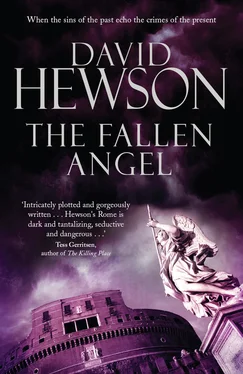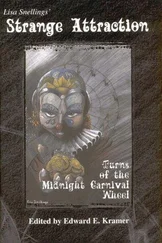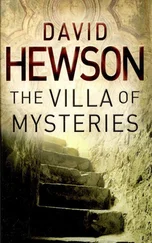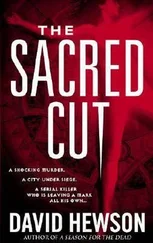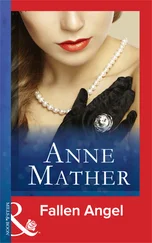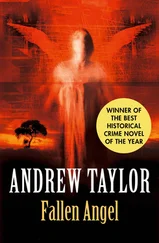David Hewson - The Fallen Angel
Здесь есть возможность читать онлайн «David Hewson - The Fallen Angel» весь текст электронной книги совершенно бесплатно (целиком полную версию без сокращений). В некоторых случаях можно слушать аудио, скачать через торрент в формате fb2 и присутствует краткое содержание. Жанр: Триллер, на английском языке. Описание произведения, (предисловие) а так же отзывы посетителей доступны на портале библиотеки ЛибКат.
- Название:The Fallen Angel
- Автор:
- Жанр:
- Год:неизвестен
- ISBN:нет данных
- Рейтинг книги:5 / 5. Голосов: 1
-
Избранное:Добавить в избранное
- Отзывы:
-
Ваша оценка:
- 100
- 1
- 2
- 3
- 4
- 5
The Fallen Angel: краткое содержание, описание и аннотация
Предлагаем к чтению аннотацию, описание, краткое содержание или предисловие (зависит от того, что написал сам автор книги «The Fallen Angel»). Если вы не нашли необходимую информацию о книге — напишите в комментариях, мы постараемся отыскать её.
The Fallen Angel — читать онлайн бесплатно полную книгу (весь текст) целиком
Ниже представлен текст книги, разбитый по страницам. Система сохранения места последней прочитанной страницы, позволяет с удобством читать онлайн бесплатно книгу «The Fallen Angel», без необходимости каждый раз заново искать на чём Вы остановились. Поставьте закладку, и сможете в любой момент перейти на страницу, на которой закончили чтение.
Интервал:
Закладка:
‘Mina, Mina,’ he said quickly, loudly too, against his own wishes. ‘Enough. Let’s get out of here.’
‘Not yet,’ she insisted, and dragged him back towards the exit, towards the thing that had stolen the breath from him a decade or more before.
It was about a metre long, a specialist weapon, unsuited for warfare or any conventional purpose. Behind the glittering steel stood a black and white photograph of Reni’s portrait of Beatrice, eyes turned to the beholder, even in this tiny print. By its side was an old book, the page open at the story of the weapon — the ‘Sword of Justice’ — that historians were convinced was used to behead Beatrice Cenci and her stepmother Lucrezia on that September day in 1599.
Mina stood stiff and upright in front of the display case, neither girl nor woman at that moment, her dark eyes full of outrage, fixed on the weapon, her breath shallow and irregular.
‘Let’s go outside,’ Costa said. ‘I promised you ice cream.’
‘Ice cream!’ she spat at him.
‘Mina. .’
‘“The Sword of Justice”?’ she asked, her voice full of heat. She was a child again at that moment. Full of the simple outrage that children possessed, the rudimentary innocence that classified all cruelty and hurt and neglect as wrong, never seeking to understand the reasons behind them.
‘They may have meant that in the sixteenth century,’ he said. ‘Not today. If anything it’s ironic.’
‘Because we’re so much more civilized now? More reasonable? More kind?’
‘Next to this,’ he said, nodding at the shaft of old stained steel behind the glass. ‘Yes. We shouldn’t bury our horrors. We should find the courage to face them.’
‘That depends on the horrors, doesn’t it? If Beatrice was alive now. . if all this happened today?’
He found his mind wouldn’t think straight for a moment. She was looking directly at him, demanding an answer.
‘How would you torture a confession out of her, Nic?’ she persisted.
‘I wouldn’t,’ he said immediately. ‘Nor would anyone. We’re not perfect but we’re better than we were.’
There was an expression on her pretty, pale face that could have been the pout of a ten-year-old. He placed a hand gently on her arm and guided her to the door. It was almost six. The place would close soon anyway.
Outside the fierceness of the day was beginning to abate. The Via Giulia looked as quiet and as beautiful as ever.
‘I promised you a gelato . .’
‘Don’t patronize me,’ she interrupted without looking at him. ‘I want to go home.’
NINE
Cecilia Gabriel printed out a copy of Bernard Santacroce’s academic paper then left Falcone and Peroni alone to poke around her husband’s gloomy office on the ground floor of the Casina delle Civette.
There were books aplenty, an office computer, some manuscripts, a music player with a collection of classical CDs, mostly Beethoven, and, on the cheap, utility desk where he worked, photographs of Gabriel’s family.
The pictures sat in a line next to the computer. Peroni stared at them, wondering, aware of Falcone’s judgemental gaze from behind him.
‘You’re the family man,’ the inspector said in the end. ‘Tell me.’
There were eight photographs in all. Mina Gabriel appeared in every one. The oldest showed her little more than five or six, the one next to it as a plain, somewhat gawky, very serious-looking kid, taller, staring straight at the camera. Gabriel’s wife was in four pictures and didn’t seem to want to smile much in any. The son appeared once, as a scowling boy of fourteen or so, tall and skinny, half-hidden behind his mother, with a head of curly brown hair that needed attention and doubtless wasn’t going to get it. None of the photographs bore any obvious visual context: a holiday destination, a birthday party, a picnic. Every picture bar one depicted the subjects seated on mundane, often slightly scruffy furniture, stiff, as if posing.
The exception was a photograph of Mina alone, recent, Peroni guessed. The girl was pictured from the waist up at a stone window. She appeared to be wearing nothing but a coloured bra or a skinny bikini top and a giggly, girlish smile. Her hair was a mess, as if she’d just climbed out of bed. She looked happy in a way it would be hard to fake. Peroni guessed the shot was taken upstairs, in the apartment Cecilia Gabriel had now reoccupied. But it dated from summer. He could see that from the full, verdant palm trees, the tone of the sun and the girl’s scant clothing by the open window. Given the timing of their stay in Rome this shot could only have been after they had moved out. Mina must have returned here with her father, got into a bikini or stripped to her underclothes, then. .
The big old cop winced. He hated cases like this.
‘Tell you what?’ he muttered.
‘Would you have a photograph like that on your desk?’ Falcone asked. ‘Of your own daughter?’
It was so easy to misread the signs, and the consequences for doing so could be terrible.
He looked Falcone in the eye and said, ‘If you manage to peek behind the scenes of any family you’ll find something that looks funny from the outside. A photo. A slap. A cross word spoken in the heat of the moment. You can’t judge people’s lives on the basis of a snapshot. If you did we’d all be guilty of something. The girl’s probably just sunbathing. Kids do. Even smart kids who belong to academic freaks on the slide. It could be nothing more than that. Everyone takes pictures of their family when they’re happy, having a nice time.’
There was a cold, disbelieving expression on Falcone’s chiselled face.
‘Sunbathing?’
‘Why not?’ Peroni pleaded. ‘Can’t anything be innocent any more? At what point did we start to tell people they couldn’t take pictures of their kids messing about being kids without someone snooping around to take a look and asking if it’s something worse?’
Falcone pointed at the picture.
‘At the point they look like that. Anyone can understand. .’
Peroni fought to keep a handle on his temper.
‘Not if you’re a parent! A normal one. The photo’s sitting on his desk. His wife must have seen it a million times. If there was something wrong, something going on, don’t you think she’d have realized?’
Falcone scowled and muttered something about how relationships could cloud someone’s vision, make them vulnerable.
‘I don’t remember anyone ever accusing you of that when you still had a wife,’ Peroni snapped back, and regretted his outburst immediately. His colleague’s marriage had been a protracted nightmare of recriminations and infidelities on both sides, one that had marked Falcone, perhaps helped make him the solitary man he was.
‘No,’ Falcone agreed, picking up the photo of the half-naked girl and looking at it very closely. ‘They didn’t. Perhaps the mother did find out in the end. Perhaps that’s what happened. The mother, the brother. . the girl maybe. I don’t know. They told him to stop. He didn’t. So finally they got together and killed him. Just like Nic said. They borrowed the idea from the Cenci girl, trying to make it look an accident.’
‘Nic didn’t say that. And besides, the Cenci all wound up dead, didn’t they? Great idea to copy, I must say. .’
‘There’s something very wrong here,’ Falcone insisted. ‘Do you really not see it?’
Peroni took one more look at the photo of the girl and issued a long, unhappy sigh.
‘I don’t know what I see if I’m honest. Families are just the world in miniature. Imperfect. Miserable as hell at times. Wrong too.’ He had to say it. ‘If you’d understood that maybe you’d still be married. Everyone’s got their secrets. You have to learn to live with them and keep them to yourself. It’s best for everyone.’
Читать дальшеИнтервал:
Закладка:
Похожие книги на «The Fallen Angel»
Представляем Вашему вниманию похожие книги на «The Fallen Angel» списком для выбора. Мы отобрали схожую по названию и смыслу литературу в надежде предоставить читателям больше вариантов отыскать новые, интересные, ещё непрочитанные произведения.
Обсуждение, отзывы о книге «The Fallen Angel» и просто собственные мнения читателей. Оставьте ваши комментарии, напишите, что Вы думаете о произведении, его смысле или главных героях. Укажите что конкретно понравилось, а что нет, и почему Вы так считаете.
